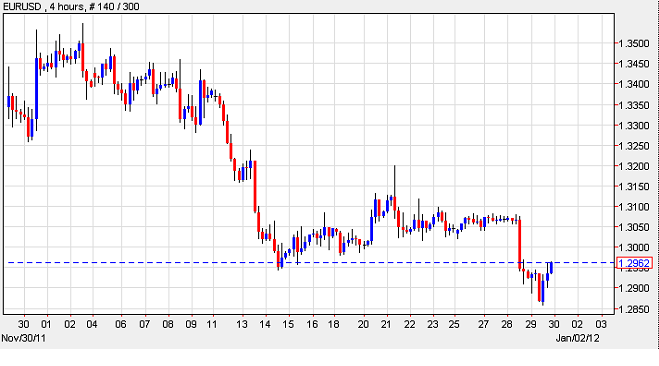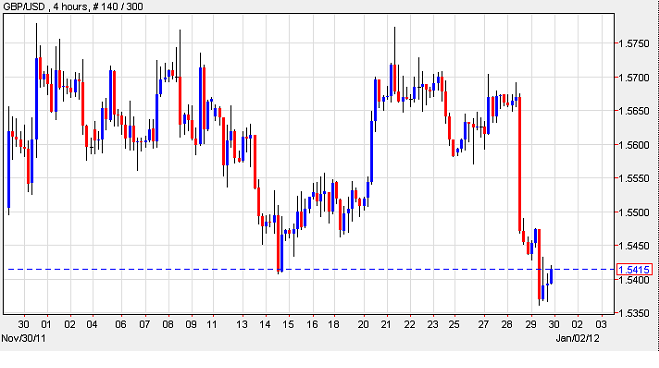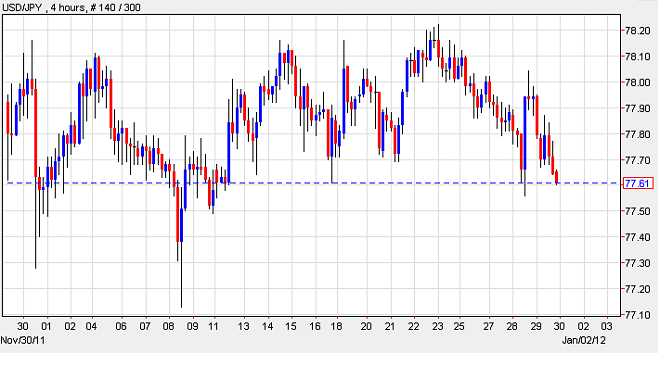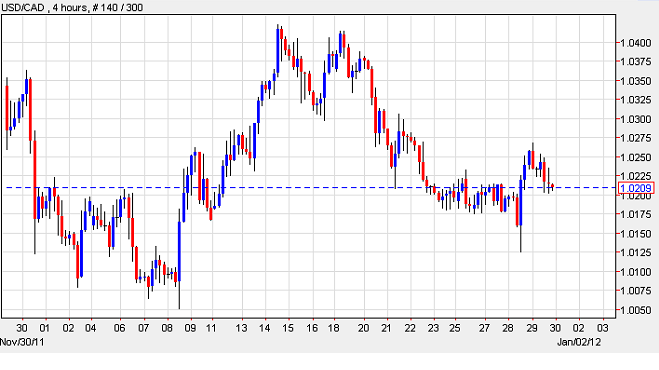The U.S. Dollar extended gains as risk aversion dominated the markets. Risk appetite declined as the Italian bond auction produced unsustainably high borrowing costs, with the 10-year
The U.S. Dollar extended gains as risk aversion dominated the markets. Risk appetite declined as the Italian bond auction produced unsustainably high borrowing costs, with the 10-year bond up to 6.98 percent yields. This rate was very close to the level that pushed countries like Ireland, Portugal and Greece to seek a financial bailout. In the U.S., economic reports indicated that Jobless Claims dropped to 375,000 last week, reaching the lowest level since the middle of 2008. Furthermore, Existing Home Sales increased 7.3 percent in November. Crude oil rose on signs the U.S. economy is growing, despite the Euro-zone’s crisis, and amid speculation that the recent tensions in the Middle East may interrupt supplies. The commodity advanced for the 7th time in one week subsequent to the news releases indicating that Jobless Claims fell to a three-year low. The Canadian Dollar traded at an 11-month high against the Euro on speculation that the European Central Bank will have no choice but to raise cash injections as Italy failed to sell its debt target during this week’s auction. The Loonie saw little change versus the U.S. Dollar as investors are optimistic that the American economy is rebounding at a rapid pace.
The Euro fell to a 15-month low against the greenback given the disappointing outcome of the Italian bond sale which reflected a low demand for long-term debt. The 17-nation currency traded at a 10-year low versus the Yen on worries that the European Central Bank will have to put more capital into the financial system in order to prevent a credit crunch. Other reports revealed that the Pound Sterling dipped to a new low for the month as traders sought refuge currencies. The British Pound continues to be weighed on by the possibility of a double-dip recession and the likelihood that the Bank of England will institute further quantitative easing. The threat of a fall-out from the Euro region looms over the U.K. but the Pound remains relatively strong as a result of the stringent fiscal policies the country has in place.
The Yen rose against most of its peers as market participants continued to demand safe havens. Recent criticism by the Federal Reserve of the country’s intervention practices prompted Yen purchasing. Negative economic data once again raised speculation that the Bank of Japan may employ more quantitative easing to boost growth.
Lastly, the Australian and New Zealand Dollars slipped to their lowest prices in one week against the Yen as investors fear the E.U. crisis may worsen and dampen demand for high-yield assets. The South Pacific monetary units continued to drop on news the Italian bond sale was quite disappointing. The currencies capped their losses as U.S. stocks recovered after the release of better than anticipated domestic economic reports.
EUR/USD- Euro Trades At 15-Month Low
The Euro touched a 15-month low against the U.S. Dollar following a disappointing Italian bond sale. The results indicated that short term capitalization stresses had eased, but investors remained skeptical about long term prospects. According to economists, this also revealed that the European Central Bank has failed in its attempt to prompt the region’s banks to buy peripheral debt. Data releases showed that the rate of growth of the M3 Money Supply dipped to 2 percent in November. Loans to households in the Euro zone also declined, while inflation levels in Germany, the biggest economy of the region, decelerated in December. EUR/USD CHART" title="EUR/USD CHART" width="659" height="366">
EUR/USD CHART" title="EUR/USD CHART" width="659" height="366">
GBP/USD- Double-Digit Recession May Hurt Sterling
The British Pound declined as risk aversion reigned in the market. The currency has benefitted from the appeal for the U.K.’s Gilts and the fiscal policies the government has instituted. However, the threat of double-dip recession is still real and there’s speculation the Bank of England will use quantitative easing in 2012 to fuel economic growth. GBP/USD CHART" title="GBP/USD CHART" width="659" height="368">
GBP/USD CHART" title="GBP/USD CHART" width="659" height="368">
USD/JPY- Yen Benefits From Risk Aversion
The Japanese currency rose against most of its counterparts as risk appetite was replaced by risk aversion, and this resulted in higher demand for refuge currencies. With recent metrics reflecting drops in Industrial Production, CPI, Retail Sales and Household Spending, analysts believe the Bank of Japan may institute further stimulus to revive the economy and this may dampen demand for the Japanese currency. However, economists believe the opposite may happen as risk appetite has exerted a big influence on the Yen in the past. USD/JPY CHART" title="USD/JPY CHART" width="658" height="370">
USD/JPY CHART" title="USD/JPY CHART" width="658" height="370">
USD/CAD- Loonie Trades At 11-Month High
The Canadian currency advanced against the Euro on the likelihood that the European Central Bank may have to increase the capital injections, given the poor results of the Italian bond sale. The Loonie rose against most of its peers on optimism the U.S. economy is advancing at a faster pace; and it benefitted further from increases in crude oil, its biggest export. USD/CAD CHART" title="USD/CAD CHART" width="659" height="370">
USD/CAD CHART" title="USD/CAD CHART" width="659" height="370">
Today’s Outlook
Today’s economic calendar shows that the U.K. will report on Nationwide HPI. In the Euro region Italy will announce PPI. There are no other releases scheduled out of the U.S., Canada, the South Pacific, or Japan.
